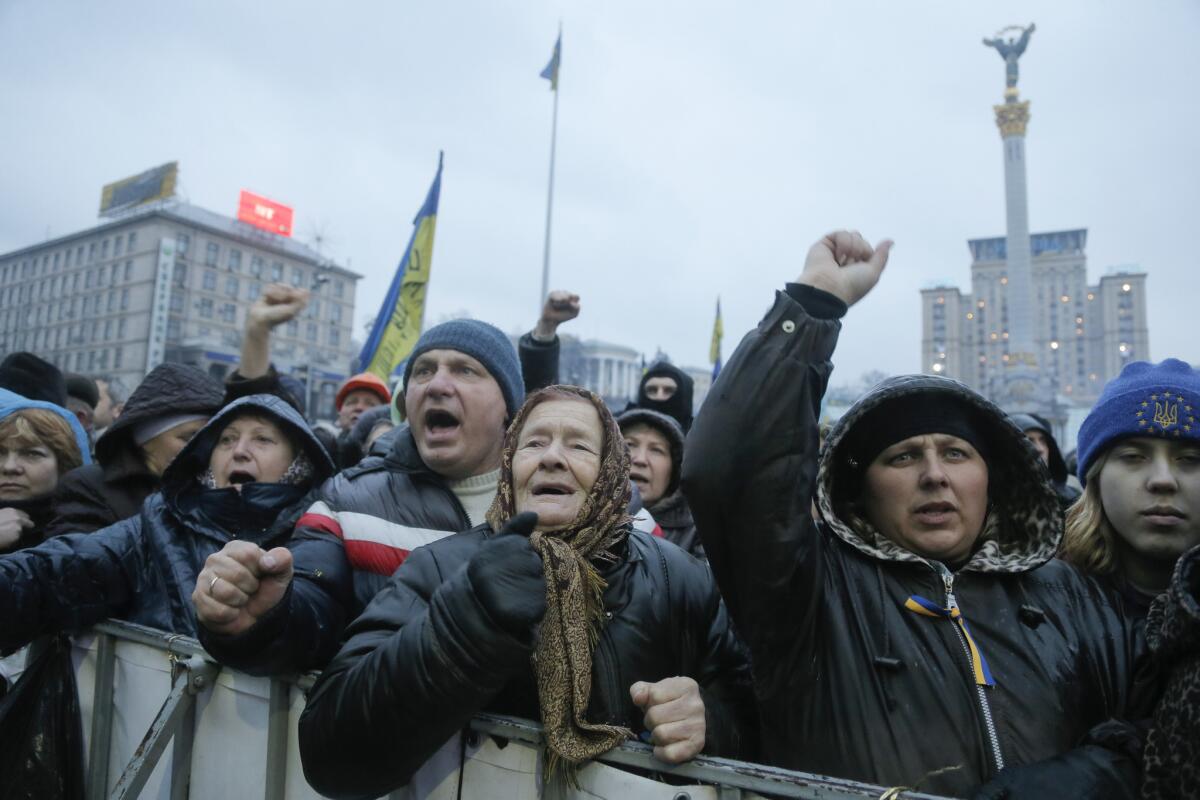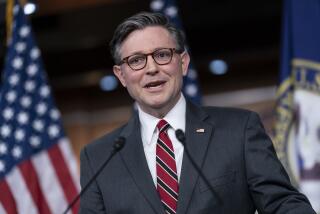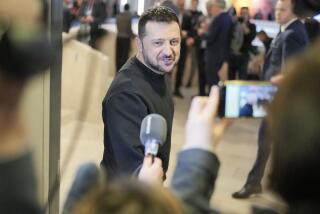White House takes a cautious approach to drama unfolding in Ukraine

WASHINGTON — Only a few short weeks ago, the turmoil in Ukraine seemed like a remote conflict in which Washington had little at stake and not a great deal of leverage.
Now, however, it is clear that the apparent collapse of the old order in Ukraine could leave the Obama administration with a mess it cannot ignore.
The challenges that could soon face the White House include a bloody, Yugoslavia-style civil war, an expensive economic bailout, and further damage to its strained but crucial relationship with Moscow.
Accordingly, the administration reacted cautiously on Saturday to the apparent departure of President Viktor F. Yanukovich from Kiev, urging a peaceful settlement and trying to avoid a confrontation with the embattled leader’s longtime Russian supporters.
In a statement, the administration suggested that it supported the goals of opposition, yet emphasized that it favors a national unity government, and, above all, an end to bloodshed.
The administration welcomes “constructive work” by the reconstituted Rada, or legislature, “and continues to urge the prompt formation of a broad, technocratic government of national unity,” said the statement, attributed to Press Secretary Jay Carney.
The administration has sought “a de-escalation of violence, constitutional change, a coalition government and early elections,” it said. “And today’s developments could move us closer to that goal.”
The administration welcomed the release of imprisoned opposition leader Yulia Tymoshenko. But it also said that U.S. officials would be working with an array of partners: “with our allies, with Russia, and with appropriate European and international organizations to support a strong, prosperous, unified and democratic Ukraine.”
A senior State Department official said that “despite some horrific and condemnable violence, things are moving in the right direction and we’ve seen some very positive developments, including the much overdue release of Yulia Timoshenko, and steps toward a unity, technical government.”
The U.S. statement is “deliberately cautious and even-handed,” said Andrew S. Weiss, vice president for studies at Carnegie Endowment for International Peace. “There’s too much uncertainty, about Yanukovich’s situation, about the Russian reaction, to take anything for granted .… We don’t know where the power lies.”
One worrisome sign from the American perspective is the shift in Russian reaction to developments over the last 24 hours.
On Friday, Obama and Russian President Vladimir Putin had a phone conversation that both sides praised afterward. Following the collapse of a peace deal brokered on Friday, the U.S. and Russia seemed to agree on the need for an end to the dispute and formation of a government that would share power between the sides.
But on Saturday, Russian Foreign Minister Sergei Lavrov sounded again confrontational toward the United States, describing the opposition as “pogromists” and saying that Putin had warned Obama about this kind of outcome.
Russian officials were also reported to have met this weekend with separatist local officials in eastern and southern Ukraine, suggesting that Moscow could be preparing to take their side in the unfolding conflict.
Weiss, a specialist on Russia and Ukraine and a former Clinton White House official, said the stakes for the U.S. appeared limited a few weeks ago because there was little hint that the political frictions would lead to the spiral of violence seen over the past few days in Kiev.
Now there is a risk of “descending into a Yugoslavia-like mass bloodletting,” he said.
Ukraine has a corrupt and deeply troubled economy, and if the Russians give up on their planned bailout, then Europe, the United States and the International Monetary Fund may be under pressure to prevent an economic collapse, Weiss said.
And the United States also cannot afford a confrontation with Russia that could further complicate U.S. goals in the Syrian civil war, in the Iranian nuclear negotiations, disarmament issues, and on other fronts. Russia has a unique ability to be a spoiler for U.S. foreign policy goals, analysts say.
One sign of Russia’s importance to U.S. goals was adoption by the United Nations Security Council on Saturday of a resolution aimed at opening the way for humanitarian supplies to reach the Syrian civil war victims.
Western diplomats have long been pushing for such a resolution, but it was held up by resistance from Russia and China, who voted for it Saturday.
Conflicts in Russia’s neighborhood “create a very powerful negative dynamic in the relationship,” Weiss said, as was apparent in the “colored revolutions” of the 2000s, and in the confrontation over Georgia in 2008.
U.S. officials appeared keenly conscious of the risk this week, as they toned down their critical comments about the Kremlin.
Earlier in the week in Indonesia, Secretary of State John F. Kerry ripped into the Russians for acting as “enablers” in the Syrian civil war by providing weapons and aid to the government of President Bashar Assad.
But by Friday administration officials had completely changed tone, talking about trade deals and a possible meeting this summer between the two presidents, and hinting that they might seek another “reset” in the U.S.-Russian relationship.
More to Read
Start your day right
Sign up for Essential California for news, features and recommendations from the L.A. Times and beyond in your inbox six days a week.
You may occasionally receive promotional content from the Los Angeles Times.







